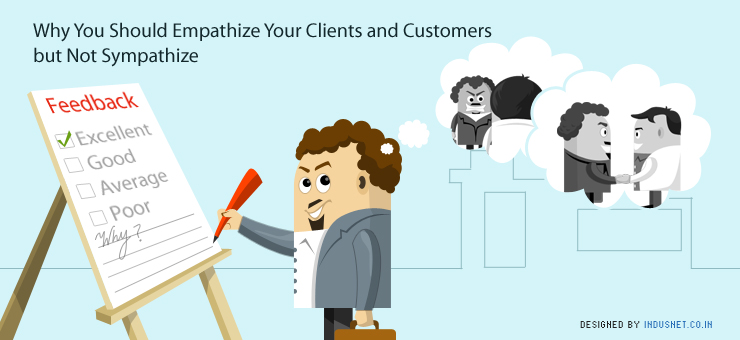
There is a huge difference between sympathy and empathy. Most people do not realize the difference and well meaning remarks and intentions may often be mistaken as patronizing behavior. This often happens when customers or clients call up customer care centers and often hear “I’m really sorry for what happened”. While that may be a way of expressing sympathy, it certainly is not what empathy is.
What Is Empathy and How Different Is It from Sympathy?
Empathy can be described in a layman’s language as “walking in the other person’s shoes to know what it feels like”. Of course, to know how exactly it feels to be the person on the other end of the phone or texting application is not possible. However, by learning to differentiate between showing sympathy to someone and empathizing with somebody, you can make or break the client or customer’s day. Sympathy feels artificial and shallow. Whereas, empathy feels genuine, concerned and proactive. Companies should always ensure that their staff is trained to be empathic and not just full of sympathy. When a customer knows that his or her problems are being understood in the real sense, chances are, they will say great things about you on social media. The key is to be empathetic and not just display shallow sympathy.
Train Your Staff to Be Empathetic
Clients and customers often feel they are not being understood and that their problems are not being addressed properly. We have all grown used to scripted apologies and displays of sympathy and the customers are no different either. When they are irritated, annoyed and not in a great mood, they shall take offense to sympathy as it will be understood as not genuine. This makes it a bad idea to repeat apologies and express sympathy when you don’t actually mean it. Thus, staff must be trained to display empathy.
Going a Step Ahead of Displaying Sympathy and Being Proactive
Displaying empathy requires people to actually take interest in the other person’s problems. It goes more than apologizing, expressing concern and reassuring. Instead, empathy is all about being proactive and doing something that actually helps the other person. We may say, that empathy is translated into action, whereas sympathy is limited to talk. People understand these sentiments at a subliminal level and it can’t be faked. Your staff needs to be trained about how to appear empathetic and not just sympathetic.
What we mean by this is, your staff will need to be very proactive and offer alternative solutions when there is a problem. They will also need to understand where the customer or client is coming from and what thoughts could be running in the customer’s mind. Usually, it is safer to assume that the client is not happy or that he or she is difficult to please. With such a belief in your mind, you will indeed put extra efforts to resolve issues, which is what showing empathy is all about.
Ask for Feedback and Ratings
Once an issue is resolved or a concern has been handled, never miss the opportu8nity to seek feedback. The feedback may not always be honest. Most people tend to say they were happy with the services even when they were not. Nonetheless, it is better to insist on more than just one feedback. When pressed for detailed review or feedback on a second time, people may open up and complain more. While it may seem like a counterproductive exercise to seek negative feedback, it is just the opposite. You will know what your weaknesses are and you will be better prepared to empathize truly with the most difficult customers too.
At the end of the day, all that you need to do is remain honest and teach your staff to be honest. Though clichéd and often repeated, in business, honesty is certainly the best policy. With honesty follows a genuine concern for your own products and services. You certainly don’t want to bring your organization or company down by offering a mediocre or average product/service, do you? In order to excel and be sure that you are excelling in whatever you do, you will need to cut sympathy out and bring empathy in.